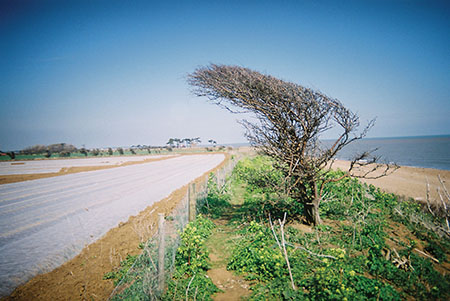Mark Fisher and Justin Barton’s Occult Cartography of the Suffolk Coastline
With references to Brian Eno, M.R. James and the BBC’s Radiophonic Workshop, the pair create an eerie ‘audio essay’ charting a walk from Felixstowe to Sutton Hoo
With references to Brian Eno, M.R. James and the BBC’s Radiophonic Workshop, the pair create an eerie ‘audio essay’ charting a walk from Felixstowe to Sutton Hoo

Eeriness is fiendishly difficult to define. Ears twitch, the body shivers and the voice fails. I tiptoe towards a description like a disturbed sleeper in a ghost story: eeriness is a strange atmospheric disturbance, a sense of malevolent presences in the air, things with preternatural knowledge which listen and lurk, unseen and unsound. This scarcely apprehended domain of disquiet is the object of Mark Fisher and Justin Barton’s audio-essay On Vanishing Land (2013), a work which proves equally elusive. Fisher is best known as a central theorist of hauntology, a critical movement that parses the present as a time of hauntings and reads our media as possessed by spectres of the past. Together with Barton – sound artist, author of the piece’s narration and past collaborator on londonunderlondon, a dark dérive from 2005 – a kind of occult cartography is performed, mapping the hidden and sinister presences within the Suffolk coastline.
Under the curatorial auspices of The Otolith Group, Fisher and Barton chart a walk from Felixstowe container port to the burial grounds at Sutton Hoo in sound; critical activity, collaborative excursions, ‘atmospheric engineering’ and psychogeography all converging in this mutant, unnamable work. ‘Audio-essay’ is a vague way of describing its formal co-ordinates. The piece never coalesces into a particular mode and for its 45 minutes commits to disorientation and amorphousness.
Through speakers hidden somewhere in this darkness comes a queasily sentient soundscape that shudders and fluctuates as if imbued with secret life. It is, at various times, sound art, field recording (if that form might tap into those strange, internal effects of a space beyond its immediate atmosphere), audio-hallucination (the listener is surrounded by looping and looming voices), documentary, elliptical fiction and allusive patchwork, often recalling Samuel Beckett’s deeply eerie radio-play Embers (1957), in which a cast of ghosts converses on a grey beach. It’s a riddle that plays in the dark, an attempt at a secret history and a ghost story about a space, the dark interior of a seascape explored through a vast array of material.
Brian Eno’s strange memory-work On Land (1982) is invoked, as are the ghost stories of M.R. James (and their television doubles), L.P. Hartley’s The Go-Between (1953) and, stretching out to the far-distant shores of Australia, Picnic at Hanging Rock, both the 1967 novel and its cinematic counterpart from eight years later. These works are mysterious and intoxicating taken in solitude, maybe so effective in their enchantment that they defy critical interrogation. But, brought together, they lead to vertiginous thinking about the strange power of space and its capacity to unsettle us. This sleepy region of southeast England is transformed into a haunted terrain which seeps into the prone bodies of its inhabitants like a bad dream.
Fisher and Barton draw up this phantom space with supreme elegance, setting their various texts into dark correspondences. The work as a whole contains more than can be catalogued here and any attempted transcription of its quicksand texture is doomed. Memory and amnesia, dreaming and waking, land and sea (and the treacherous, liminal spaces between) are only part of its inventory of fascinations. Other voices appear intermittently, taken from interviews conducted by the artists, their talk of buried memories and recurring dreams testifying to supernatural presences before slipping away again, coming through in tidal swells and sighs. The feeling of claustrophia in this enveloping darkness is followed by what the narration calls ‘a delirium of detachment’, a seductive disorientation which, in turn, lures the listener deeper and deeper into the soundscape until, gradually unanchored, the surroundings slip away. A hallucinatory power takes hold: you can see in the dark. Seething around the voices is sound-work by Raime, Mordant Music, Ekoplekz and several others – electronic noise of a particular bleakness and ferocity.
Eno’s On Land reconstructs the Suffolk terrain he explored as a child as a shadowland music of translucent electronic textures, emerging through atmospheric gloom and suffused with vague dread. On Vanishing Land suggests a version of that album deformed by contemporary bass pressure, crackle and murk, as if it were filtered through five industrial pollutants then left to fester in a derelict warehouse.
The work is perhaps closest to Delia Derbyshire’s five-part suite Dreams (1964) made in the BBC’s Radiophonic Workshop, an oblique sort of audio-essay pieced together from strange chiming tape loops and various cut-up interviews. Participants recount recurring dreams and nightmares collected according to their dreamed space – the sea and the land, for instance. This is the territory of On Vanishing Land: that moment where familiar space suddenly becomes invested with secret malevolence and unnamable strangeness. This is what haunts: we are no longer where we thought but somehow trespassing elsewhere and, suddenly, stepping into the otherworldly.



















